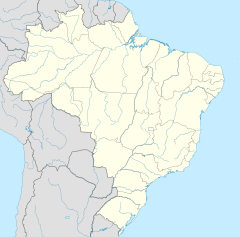The Church and Convent of Our Lady of Solitude (Portuguese: Igreja e Convento de Nossa Senhora da Soledade) is an 18th-century Roman Catholic church and former convent in Salvador, Bahia, Brazil. The church and convent were founded in 1736 and are dedicated to Our Lady of Solitude. The convent has functioned as a school since 1927. The Church and Convent of Our Lady of Solitude is located within the Protected Historic District of Soledade (Área de Proteção Contígua--Soledade) by the State of Bahia.[1][2][3]
| Church and Convent of Our Lady of Solitude | |
|---|---|
Igreja e Convento de Nossa Senhora da Soledade | |
 Church and Convent of Our Lady of Solitude, Salvador, Bahia, Brazil | |
| Religion | |
| Affiliation | Catholic |
| Rite | Roman |
| Location | |
| Municipality | Salvador |
| State | Bahia |
| Country | Brazil |
| Geographic coordinates | 12°57′28″S 38°29′58″W / 12.957867°S 38.499318°W |
| Architecture | |
| Date established | 1738 |
| Direction of façade | West |
| Designated | 1938 |
| Reference no. | 90 |
History
editGabriel Malagrida, an Italian Jesuit priest, arrived in Bahia in 1736. Malagrida was granted land by José Fialho, Archbishop of Bahia, and Luís Peregrino de Ataíde, the 10th Count of Atouguia, previously owned by a hermitage dedicated to Our Lady of Solitude. Little is known about the early hermitage, other than that it was located near the Queimado Fountain, a reliable source of water. Malagrida was associated with the Company of St. Ursula and south to establish a recolhimento, or center, for girls who sought to enter religious life. A convent was built with a rooms around a large cloister. A church was built at the same time. The convent was converted into a school in 1927.[1][3]
Location
editThe Church and Convent of Our Lady of Solitude is located in the Soledade district north of the Historic Center of Salvador. It sits on Ladeira da Soledade, a street which originally connected Soledade to the historic center of Salvador. The Ladeira da Soledade was "a suburb where there was little more than a convent, some plantations and a fine view over the bay" in the colonial period.[4] It is now home to numerous colonial-period solares, or manor homes, notably Solar Bandeira, constructed below the church and convent in the late 18th century.[2][3]
Structure
editThe Church and Convent of Our Lady of Solitude consists of a church with a rectangular nave, small sacristy, and library; a convent with a large cloister, basement and two floors above ground level; and a three-story belvedere with a view over the Bay of All Saints. The Convent of Solitude is one of three convents with a three-story belvedere in Salvador, the others being at the convents of Desterro and Lapa.[1][3]
Protected status
editThe Church and Convent of Our Lady of Solitude is located within the Protected Historic District of Soledade (Área de Proteção Contígua--Soledade) by the State of Bahia. The protected district was established in 1983.[5]
Access
editThe Church and Convent of Our Lady of Solitude functions as a school and may not be visited.
References
edit- ^ a b c Lins, Eugénio Ávila (2013). "Igreja e Convento de Nossa Senhora da Soledade". Lisbon, Portugal: Heritage of Portuguese Influence/Património de Influência Portuguesa. Retrieved 2018-12-11.
- ^ a b "Área de proteção contígua - Soledade" (in Portuguese). Salvador, Brazil: IPAC. 2018. Retrieved 2018-12-11.
- ^ a b c d Secretaria da Indústria, Comércio e Turismo (Bahia, Brazil) (1997). IPAC-BA: inventário de proteção do acervo cultural. Vol. 1 (3 ed.). Salvador, Brazil: Secretaria da Indústria e Comércio. pp. 117–118.
{{cite book}}: CS1 maint: multiple names: authors list (link) - ^ Lacerda, Ana Maria (2013). "Solar Bandeira". Lisbon, Portugal: Heritage of Portuguese Influence/Património de Influência Portuguesa. Retrieved 2018-11-07.
- ^ Lei nº 3289 de 21 de setembro de 1983, O Prefeito Municipal do Salvador, Capital do Estado da Bahia (in Portuguese). September 21, 1983.

